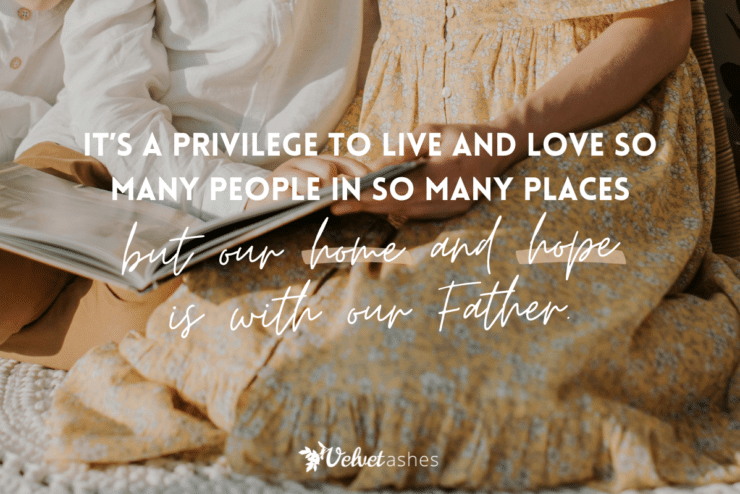Contrary to popular belief, love is not a verb, and it isn’t a choice. If it’s true that love is unfailingly patient and kind, that it isn’t irritable or resentful, that it bears all things while still hanging on to hope, then I for one cannot yank on my bootstraps hard enough to pull myself up to love, not even for the family for whom my heart beats. No, Love is a person. A person we progressively become acquainted with, increasing our capacity for friendship and communion as we journey.
The good news is that whatever traits we have or lack, The Better Way is introduced as a level playing field. It is judicious to admire, desire and cultivate gifts of articulation, leadership, and intelligence (to name a few) but Love shows no partiality. He is near to any and all and Love is inimitable. Simple this may be, but living into it is hard-won.
The bad news is that it is possible to come all this way, to suffer my body to jetlag, to be so cold climbing into a deep-freeze would be an improvement, to be stroked by curious strangers, and still miss the mark. Love begets sacrifice but the sacrifice itself is not love. The fact is, I can hammer my gong and bang my cymbals together here in Asia as well as I can in North America or on any other continent, I’m sure.
It is reasonable to be irritated when the young teammate spins the lazy susan out from under my chopsticks, again. But I want my natural response not to be a huffy counter spin or cold correction. It is fitting to be grumpy and grieved when the time I so carefully set aside and protected is interrupted. It is right to despair when peace in my home is the exception, but it is wrong to give up hope, shrug my tension knotted shoulders and resign to, “I guess this is the way it goes this side of heaven.”
Because we are All God’s Children, we know what love is and have an appetite for giving and receiving it in many forms. Wholesome bursts and steady commitments should be noticed, savored and celebrated, and there is more.
When learning another language, sweet is the moment when we speak what we mean to say in the moment we mean to say it and seemingly without effort. In reality, the effort has already been made, the labor finished and we are operating in the principle of automaticity. One of these phrases that I have mastered in more ways than one is man man lai, which translates “proceed slowly” with a nod to the natural state in which we are prone to stumble. Though I stumble, gradually my automatic response to the feelings of irritability, grief, grumpiness, and despair can become authentically Love’s. How?
If Love is a person then I can practice Love’s presence. I am a slooowww study at this. But the truest thing about me and about you is our desire for Love. And to be quite honest and irreverent, for a while it felt like prayer failed me as a way to enter this presence. My mind is regularly too ignorant and weary to express my need or devotion, but my soul yearns to name the chaos of the deep. It turns out that there is something between my own consciousness and the too deep groanings, the voices of other pilgrims. Literally, I’ve been praying Puritan prayers as collected by Arthur Bennett in The Valley of Vision. And through these prayers some hard-won ground is traversed and I resolve to journey on. With these fellow pilgrims I know that One thing alone is needful, to love my Saviour. And I ask, Increase my love, O my God, through time and eternity.
When, how, where do you commune with Love? Do you have any prayers that help you? What hard-won ground are you traversing?





“Love begets sacrifice, but the sacrifice itself is not love.” So true (sometimes, unfortunately, for our broken selves). That ENTIRE paragraph is pretty cuttingly brilliant. Need to remember that “I can hammer my gong and bang my cymbals together here in Asia as well as I can in North America.”
Elizabeth, thank you for this comment. May we be people who love.
“Cuttingly brilliant” describes it perfectly. And I resonated with the last paragraph too. I’m a slow study as well, but, oh the soul yearns!
I’m glad this was meaningful to you. May we be as patient with ourselves (and others) in the transformation process as Love is with us.
I want to quote back to you this whole post to say how insightful I find it. But the part thats really gonna stick with me is the idea that Love is neither verb nor choice (because that would make our lives miserably legalistic and discouraging like nothing else) but a Person. What an amazing summary of all of scripture, which constantly emphasizes knowing God a
as the key, from beginning to end. Thanks for this, I have been confused by the love as a verb idea and the places that leads. I really needed that insight.
Sweet! I found a new measure of freedom and repentance (same thing?) in these thoughts as well. I’m glad there’s some takeaway here for you too.
beautiful, goes to the core of our need to be wholly loved. The prayers of others do touch that deep place but for me worship will consistently bring me to an openness to Presence that I experience in no other devotional practice. It is hard to find the space to be before Him with my whole heart in this crowded busy overseas worker compound but Kim…you have reminded me of how much I need to get away and be alone with my beloved Lord. I could have so much more for others if I spent that time.
Yes, sometimes we have to get pretty creative to find time and space for this. Thanks for bringing music into this conversation. What are some of your favorite songs for worship right now?
Kim, thank you for exercising your gift with words and wrestling with phrasing to articulate this truth. I, too, struggle to express my devotion and have turned to others’ prayers and even songs for the words I can’t seem to find. I am also challenged to practice silence in His presence, to discipline my heart to be still, to listen to Love, and to simply be with Love.
Nice, Shelly. Intentional silence and solitude was a new and challenging practice for me in the last year. I worked my way through Ruth Haley Barton’s manual “Invitation to Silence and Solitude” (http://tinyurl.com/l4da39g). This is a rich practice. Thanks for bringing it into the discussion.
[…] There are still boulders, big and immovable on the path of Life: poverty, inequality, prejudice, and egocentrism to name a few. We, the people of God, have a consuming desire and responsibility to move those mountains in good faith. We dare not settle for the hope that everything will be made right in the end without realizing that it is through us that it may be so. Together in mass we multiply our strength to actively push the boulders as we also pray and sing and long for the Kingdom. We teachers have leverage. We wedge our lever under the load, ease backwards to the force side and push down. The boulder budges, the people of God gain momentum, the path of Life widens and more are added to our numbers. To be clear, I am not suggesting that our position as teachers gives us free rein to talk about God or the Bible or share our faith in the classroom. I am also not suggesting that the firstfruits of our teaching are more precious than the firstfruits of other professions. Our leverage is, however, unique. The small things of teaching–questions leading to the moral dimension, genuine and well-timed encouragement, firm but gentle correction, modeling tenacity—are easily overlooked and even despised. But this is where we rejoice because we have seen work like this done before. Paul, a teacher, insisted that the life of faith and freedom must be lived by the Spirit. As he himself endeavored to live that way, he traveled much, he wrote stirring letters, and he taught at every opportunity. In Athens at the Areopagus, Paul taught the ones who hadn’t brushed him off in the streets. He credited them with religious sincerity. Owning his fascination with all the shrines he came across in their city he isolated the one with the most mystery. Appealing to their intelligence he introduced them to a better way to know Yahweh. Some scoffed, some wanted more teaching, at least two were convinced. In his letter to the Corinthians, Paul taught the already convinced, the church, about “the various ways God’s Spirit gets worked into our lives.”[1]Teachers are listed among the “important” parts. But, and don’t miss this, there’s a better way still. What might Paul say to us teachers today? After exhorting us to live life in step with the Spirit, it could be to observe what is true and right and good where we are, to call out those things with affirmation watching for the ones intrigued and questioning. Then humbly and intelligently lead our students to a better way, a way we have access to through our life in the Spirit, a way we can share through active participation and engagement in our field. And finally, the best of all, to love. […]